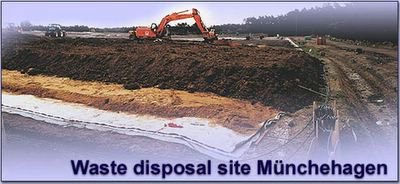Italy and the Eco-Mafia. Redux.
Still keeping on the subject of what we do with our toxic waste, I see that the proposed new EU bill regarding chemicals use in the EU, REACH, is progressing well at the moment. It is a very watered down version of the original proposal by Guido Sacconi, but surely a step in the right direction. I briefly touched on the problem of toxic waste disposal yesterday, with the discovery that the USA had disposed of its own vast arsenal of chemical weapons after WW2 by simply dumping everything overboard into the sea. The results of that massive dumping should be clear now, so why is there so much resistance from governments all around the world to actually put in real controls?
Here in Italy there has been a major waste disposal problem for many years. A problem that became very public here a couple of years ago, with protesters in Montecorvino Rovella, about 60km south-east of Naples, stopping trains to complain about the re-opening of a local waste landfill site. On the surface it might have seemed all very honourable and decent, but the groundswell of opinion was that they were really acting on behalf of the local Camorristi that had a great deal of interest in keeping the waste processing and disposal sites closed in favour of their own “facilities” which were on offer to the local communities, even bringing the wrath of the EU down when the EU issued a “Reasoned Opinion” over the waste disposal contracts awarded in Naples.
This has resulted in the wholly bizarre situation where domestic rubbish is hauled (by Camorristi approved hauliers, of course) as far as Germany for disposal, whilst toxic and nuclear waste is hauled all the way back down to southern Italy for its subsequent disposal. The toxic waste is “lost” in a wide variety of ways, from the more obvious methods such as digging a big hole and tipping it in, to giving it away to farmers for use as fertiliser. The nuclear waste is usually dumped at sea, allegedly, although there have been attempts to bury it in Basilicata (the most seismically active region in Italy).
Of course, the driving force is money, although it is always very short-term money. There seems to be no thought given for the welfare of future generations of children, whether they are just the children of local paesani or the children and grandchildren of the local don and his political allies. It is the final levelling, I suppose, although I doubt it is the kind of levelling that is in the mind of either the Camorristi nor the local politicians when they pat their bulging wallet with a knowing grin.
Italian landfill in action - in Germany.

















0 Comments:
Posta un commento
<< Home